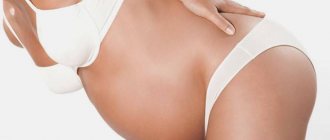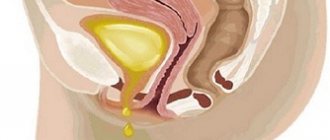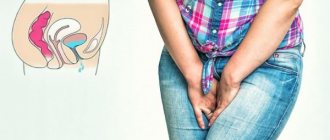The most wonderful period in a woman’s life is pregnancy, the time of waiting to meet her baby. During the period of bearing a child, the expectant mother, in addition to joyful emotions, experiences all the symptoms of toxicosis: nausea, dizziness, lack of appetite. Urinary incontinence during pregnancy also causes a lot of inconvenience, often appearing already in the first trimester. This condition occurs in many women and is usually not considered a pathology, but there are exceptions. Therefore, if you leak urine during pregnancy, you should immediately consult your gynecologist.
What causes the disease?
Why does incontinence occur? The syndrome of uncontrolled outflow of urine is considered a pathological condition of the female organs of the excretory system and the pelvic floor muscles, which are responsible for the reflex compression and relaxation of the fibers that control the natural outflow of urine. The disease cannot develop on its own, but for its appearance there must always be one or a whole complex of negative factors present. Urination when coughing in women can occur for the following reasons:
- various diseases of the central nervous system that disrupt the function of sending a neural impulse to the muscles located around the bladder and inside the pelvis (the absence of a clear neural signal from the centers of the brain to the organs of the genitourinary system leads to a decrease in muscle tone even with the slightest load in the form of coughing , several drops of urine leak out, and in case of severe damage to the central nervous system, urine appears in large portions);
- wandering urethra syndrome, when there is insufficient fixation of the organ by the pelvic floor muscles;
- increased pressure inside the bladder caused by infectious diseases, impaired local circulation, or tumor processes in nearby organs that exert static pressure;
- diabetes mellitus (exceeding the level of glucose in the blood disrupts the functioning of the cardiovascular and nervous systems, which provokes a decrease in the reflex activity of the muscle fibers of the bladder);
- injuries received during the birth of a child (urinary incontinence when sneezing is observed in women of all age groups whose childbirth took place with complications, vaginal ruptures, and slow passage of the child through the tubes);
- infectious diseases that affect the tissues of the genitourinary system (during an exacerbation of the disease, it is enough to cough for spontaneous leakage of urine onto the surface of the underwear);
- state of stress (urinary incontinence in women, which arises for this reason, is characterized by its manifestation during periods of excitement, psycho-emotional stress);
- brain tumor (urinary incontinence when coughing and sneezing occurs if a foreign tumor has affected the areas responsible for the functioning of the organs of the female genitourinary system).
Each of the above reasons that cause involuntary urination when coughing requires complex medical therapy. Only after eliminating the negative factors affecting the functioning of the female genitourinary system is a complete cure for such an unpleasant disease possible.
Options for solving the problem
Since incontinence is a temporary phenomenon, no specific therapy is carried out. If there is a suspicion of pathological processes in the mother's body, a diagnosis is performed and a gentle treatment regimen is selected, aimed at eliminating the provoking cause and preserving the health of the mother and child. In other cases, doctors try to manage with conservative non-drug methods.
Application of the bandage
One option to help reduce the frequency of the urge to urinate and minimize discomfort is to wear a bandage. Due to its special design, the accessory helps support the abdomen, evenly distributing the load on different parts of the back and preventing weakening and muscle prolapse. It reduces pressure on the bladder and urethra, which results in fewer trips to the toilet.
With the help of a specialist, it is necessary to select the most convenient model, taking into account the gestation period, the size of the abdomen and the characteristics of the figure. Any design made of thick fabric and elastic bands should be purchased preferably at a pharmacy. Wearing the accessory is only allowed while you are awake; it must be removed at night. The most convenient option is bandage panties. Due to the presence of a wide ribbon, the product holds the stomach well. Due to frequent washing, it is recommended to purchase several sets of linen.
Gymnastics to strengthen the pelvic floor in pregnant women
Another common method of preventing and treating urinary incontinence is gymnastics. The sets of exercises proposed by the doctor A. Kegel are popular. According to the patients themselves, regular exercises using this technique allow you to control urination and strengthen the pelvic floor muscles, which minimizes the risk of ruptures during childbirth.
Features consist in alternate compression and relaxation of intimate muscles, which are reproduced in a certain sequence. The following exercises are considered the most common and easiest.
- Hold. Having completely relaxed, the woman needs to imagine that she is trying to stop urination. Periods of tension and rest alternate and last 10 seconds.
- Elevator. Slowly pull the muscles into yourself, imagining a rising cabin. Hold the position for 10 seconds and suddenly relax.
You can practice on your own, or take lessons from a trainer. The intensity of training and the number of approaches should be increased gradually. With regular 30-40 minute daily practice, the result will become noticeable within 3-4 weeks. If you don't have enough time to train, an exercise with a tennis ball will help. Holding it between your thighs, you should walk around the room for at least a quarter of an hour. The condition is the absence of contraindications.
Traditional methods
In the fight against urinary incontinence during pregnancy, especially in the later stages, it is allowed to resort to traditional medicine, which does not have side effects and is absolutely safe for both the mother and her baby. In most cases, home remedies prepared according to the following recipes are used.
- A decoction of dill seeds. Pour a tablespoon of boiling water and leave for at least three hours. Take the product 100 ml every 4 hours. The course is at least a week.
- Sage tea. Stir 40-50 g of dry herb in a liter of boiling water and leave for 4 hours. Drink the strained liquid three times a day, 250 ml.
If there are no problems with the kidneys, then you can use a decoction of rose hips, lingonberries, and parsley root. If there is no result, both during pregnancy and after childbirth, an examination should be carried out and an appropriate course of treatment should be completed.
Features of drinking regime and nutrition
To control the process of urination, doctors recommend strictly monitoring the amount and types of liquid consumed. So, they advise completely giving up alcohol, coffee, tea, carbonated drinks, and instead switching to natural juices and clean water. The total volume should not exceed 2 liters, and first courses should also be taken into account when calculating the amount of drink. To avoid swelling, you need to limit drinks or water in the evening, and you should completely empty your bladder before going to bed. This will help prevent stagnation of urine, the development of infection and ensure normal, long-term sleep.
Prevention of urinary incontinence
To prevent urinary incontinence, you must:
- quit smoking so as not to provoke a smoker’s chronic cough;
- go to the doctor immediately after the first signs of pathology appear;
- perform daily exercises to strengthen the muscles of the pelvic floor;
- get rid of extra pounds;
- take more frequent walks and exercise;
- do not abuse caffeine, beer and strong alcoholic drinks;
- improve your diet and avoid causing constipation, which can also contribute to enuresis.
Urinary incontinence occurs because pressure increases inside the peritoneum, which affects the urethra and contributes to increased pressure in the urethral canal. Malfunctions of the valve make it impossible to retain urine, which subsequently leads to spontaneous excretion of a small amount of urine. Doctors note the following causes of incontinence:
- damage to organs localized in the pelvis;
- tumors that are located in the peritoneum, increasing and putting pressure on the bladder;
- hormonal imbalances;
- chronic inflammatory processes in the urinary system;
- uterine prolapse;
- frequent catheterization.
Urinary incontinence due to sneezing is diagnosed much more often in women than in the male population. The problem mainly affects females who are over 40 years old, as well as girls who have recently given birth. Doctors agree that incontinence occurs when there are deviations in the structure of the urinary system.
Often women experience urinary incontinence when they are pregnant, during menopause, men - with prostate disease, children - in a stressful situation. When a person coughs, his intra-abdominal pressure increases sharply, the bladder muscles tense, and urine is released, especially if the sphincter is weakened.
This type of incontinence is called stress incontinence, which can be caused by:
- pregnancy;
- excessive physical activity;
- injuries;
- operations;
- tumors;
- smoking;
- excess weight;
- pathologies of the genitourinary system.
Among women
If a woman has a weak bladder, there are a number of reasons for this:
- severe traumatic childbirth, which results in not only rupture of the perineum, but also severe stretching of the pelvic muscles;
- excess weight, which puts pressure on the bladder, as a result of which urine does not hold in it;
- gynecological operations to remove tumors and cysts;
- changes in hormonal levels during menopause, leading to a decrease in muscle elasticity;
- features of the anatomy, requiring a short and wide urethra to have strong pelvic floor muscles.
In men
Men suffer from involuntary urination when coughing much less often than women. The cause of this pathology is weakening of the sphincter muscles after surgery on the prostate gland.
In children
Stress incontinence in children when coughing is quite rare. In the presence of this pathology, a very small amount of urine is released. At this moment, abdominal pressure rises sharply. Such children most often have insufficiency of the urethral sphincter and pelvic floor muscles. The reason may be:
- neurological diseases;
- spinal cord injuries;
- consequences of surgical interventions.
Incontinence is any involuntary urination. This pathology can manifest itself with severe coughing, sneezing, or laughing. This is the first degree of problem. Next, a condition develops when urine discharge occurs when running, jumping, or standing up quickly.
The most severe manifestation is considered to be involuntary loss of urine at rest and during sleep. This happens due to the inability of the urethral sphincter to fully perform its function. There are many reasons for the problem.
Nature of symptoms
Stress incontinence is the most common. It occurs when there is a sharp increase in intra-abdominal pressure as a result of varying loads. This may include coughing, sneezing, heavy lifting, or sudden movement. A person is afraid to even laugh.
The urgent type is the appearance of a sharp urge that is difficult to restrain. However, the content may be small. There is a mixed form, when the cause may be manifestations of the first two groups.
For a child under two years of age, urinary incontinence is a physiological norm, especially nocturnal enuresis in boys. At an older age, persistence of the disorder indicates a delay in the development of the nervous system and requires consultation with a doctor. Men encounter this problem due to the following problems:
- frequent constipation;
- pelvic organ prolapse;
- passive lifestyle;
- diseases of the nervous system;
- stroke, paresis;
- surgical intervention on the genitourinary organs.
All these pathologies require treatment. With timely treatment, you can get rid of the problem or significantly alleviate the condition. Urinary incontinence when coughing in women can occur for the following reasons:
- During pregnancy and childbirth, tissues and pelvic organs withstand enormous loads, their elasticity decreases, and innervation is disrupted.
- The flow of estrogen into tissues decreases during the period before menopause.
- With the onset of menopause, a lack of progesterone reduces the tone of the bladder sphincter.
- Excess body weight contributes to increased stress on the genitourinary system.
- There is a history of gynecological operations.
Advice! If the expectant mother has symptoms of enuresis, there is no need to worry. Very often, after the birth of the baby, the condition stabilizes. When this does not happen, you should seek medical help.
The problem of urinary incontinence when sneezing occurs much more often in women than in men. This is due to the different structure of the urethra. In the weaker sex it is short and wide, while in the stronger sex the urethra is of considerable length.
One should also take into account the load that the fair half experiences during the period of bearing a baby. This can lead to the appearance of such pathology at a young age. Over the years, hormonal changes that have arisen only aggravate the condition.
When urinary incontinence occurs when coughing, women often believe that nothing needs to be done, because many people they know suffer from this phenomenon. This is a misconception and you should definitely consult a doctor.
This condition causes a decrease in quality of life, social activity, and leads to depression.
It is important to know! Uncontrolled urination can be a symptom of various diseases. And this is not only cystitis, but also hormonal disorders and tumor processes. With timely treatment, in most cases, medicine can help the patient.
To diagnose the cause of urinary incontinence, the doctor takes a detailed history and examines the patient. Body mass index must be analyzed, the amount of fluid drunk and urine produced within one day is taken into account.
A test is carried out, the essence of which is as follows: the patient is asked to cough several times and the presence or absence of urine discharge from the urethra is recorded. Laboratory tests are ordered and the blood is checked for hormones.
Additional research may be needed:
- cystoscopy;
- Ultrasound;
- CT scan;
- X-ray;
- urodynamic test.
Consultations with a urologist, gynecologist and other specialized specialists will help in making a diagnosis. It is also recommended to keep a diary for several days, where data on the number and volume of urination is entered, episodes of incontinence are taken into account, and the factors that caused the involuntary release of urine are described. This will help the doctor assess the situation more accurately.
Incontinence in the 2nd trimester
Many women during pregnancy experience incontinence in the second trimester. At this time, the fetus is actively growing, begins to move, and the pressure on the bladder increases many times over. To solve the problem at this time, doctors recommend resorting to the following tips:
- wear a special bandage - it will help keep the muscles in the desired position, relieve tone and pressure on the pelvic organs. The extra load on the bladder will subside, and the woman will feel much better. However, to get the effect, you need to choose a high-quality bandage;
- Go to the toilet regularly; you cannot restrain even the slightest urge. In addition, you should avoid places where there are no public restrooms. When urinating, you need to take the correct position. To do this, you need to slightly tilt your body forward and tense your lower abdomen. This position will allow you to fully open the urethra and empty the bladder;
- observe the rules of personal hygiene - during the second trimester you should avoid synthetic and coarse fabrics. It is necessary to wash yourself daily using herbal decoctions. It is worth using soap or other products 1-2 times a day. Otherwise, this approach to hygiene will lead to disruption of the vaginal microflora;
- Compliance with the drinking regime will help avoid not only incontinence, but also edema. It is recommended to drink no more than two liters of liquid per day. At the same time, you should completely give up coffee and carbonated water. It is also necessary to take into account the amount of liquid contained in the first courses;
- exclusion of diuretic products from the diet - you should limit the consumption of certain vegetables and fruits. Thus, melon, watermelon, tomatoes, cucumbers and celery have a pronounced diuretic effect. You should not completely exclude them from your diet, as they are rich in beneficial microelements and vitamins.
During the second trimester, you can do Kegel exercises. However, they must be performed with extreme caution. Excessive tension in the vaginal muscles can provoke false contractions, so you should consult a gynecologist before training.
Types of urinary incontinence
The problem of unauthorized urination in women is classified into separate types based on the conditions under which urine begins to be released. Based on established medical practice in the field of urology, the following types of urinary incontinence during cough are distinguished:
- involuntary leakage of urine (most often associated with dysfunction of the nerve endings responsible for the functioning of the bladder, as well as weakness of the pelvic muscles);
- urgent (uncontrolled outflow of urine, which occurs immediately as soon as the patient has a desire to go to the toilet, and then she starts coughing);
- enuresis (urine is not retained only during the period of time when the woman is sleeping);
- residual (occurs with severe coughing or sneezing in women who urinated 10-15 minutes ago and the urine was not completely released);
- paradoxical (this type of urinary incontinence during severe coughing or sneezing is characterized by the release of urine in even portions, a few drops at a time, and therefore the woman does not feel a strong desire to go to the toilet);
- stressful (quite often accompanied by bronchial spasm, when, from excitement, increased psycho-emotional arousal, a woman begins to have a coughing attack and spontaneous leakage of urine, the process of which may not be felt);
- reflex (the most complex type of urinary incontinence syndrome, which is difficult to treat, since it is not always possible to establish the true cause that provokes a sharp relaxation of the bladder).
For each type of disease, an individual course of therapy is selected, pathological causes that increase the risk of further development of dysfunction of the excretory system organs are eliminated.
When should you see a doctor?
If the expectant mother begins to notice that she is leaking urine, she should immediately consult a doctor. To determine what causes this condition, as well as preventive measures, the specialist suggests undergoing several types of examination:
- visual inspection on the chair;
- ultrasonography;
- urine analysis for flora and general.
A woman is recommended to keep a special diary, where she should indicate the number of urinations per day (controlled and uncontrolled). The clinical picture will help the doctor determine the correct cause of incontinence.
A woman needs to remember that urinary incontinence during pregnancy can be a manifestation of an infection of the reproductive system, so you should not hesitate to visit a gynecologist. This disease develops during gestation or its chronic form worsens. In this case, the expectant mother needs to undergo a course of appropriate treatment.
If the diagnosis does not show the presence of a genitourinary disease, the specialist will give general recommendations. It is recommended for a woman:
- carefully monitor personal hygiene, take a shower several times a day, change the pad often, and you should wear natural cotton underwear without the admixture of synthetic fibers;
- control your drinking regime;
- avoid salty and smoked foods, after eating which thirst appears;
- perform special exercises.
If the symptoms of incontinence are clearly expressed, the doctor may prescribe gentle treatment for the pregnant woman. As a rule, natural herbal preparations are prescribed. Herbs will help relieve existing inflammation by affecting pathogenic flora. Sometimes antispasmodics are prescribed so that a woman can control all acts of urination.
Why is incontinence dangerous in pregnant women?
The causes of coughing incontinence in pregnant women can be:
- weak pelvic floor muscles;
- severe distension of the bladder;
- weakening of the sphincter;
- uterine pressure;
- fetal movement.
Although urinary incontinence when coughing does not pose a danger to pregnant women and the unborn baby, it is worth visiting an antenatal clinic to rule out possible pregnancy complications. These include leakage of amniotic fluid as a result of microscopic ruptures of the bladder. This complication can lead to infection of the amniotic fluid and infection of the child. During the examination, the doctor will prescribe tests and, if necessary, a diet.
You should consult a doctor as soon as possible if urine discharge when coughing is accompanied by a burning sensation or pain, and a few drops are released. Kidney pathology should be ruled out by visiting a urologist and doing a series of tests. The combination of urinary incontinence and constant thirst may signal the development of gestational diabetes.
Causes
Experts differentiate 2 types of urine leakage during pregnancy:
- Stress appears due to pressure on the bladder due to weakness of the pelvic floor muscles and physical activity. Usually appears when coughing or laughing.
- Imperative , that is, occurring with the urge to urinate.
In addition, there is a mixed form .
- Urinary incontinence in men. What types of this disease are there and how is it treated?
The cause of leakage in early pregnancy is hormonal changes in the body. The ovaries produce an increased amount of progesterone, a hormone that promotes the elasticity of the pelvic muscles. As a result, the muscles stretch, causing the tone of the bladder.
At later stages (usually the third trimester), the causes of leakage may be the following:
- Compression and reduction in the volume of the bladder due to the pressure of the enlarged uterus. As a result, the functional activity of the bladder decreases, and not all urine is removed from it at once.
- Pressure of the uterus, which has increased in size, on the urethra. This causes frequent urination in small portions. At the same time, the uterus also puts pressure on the urinary reservoir, which leads to random leakage of urine.
- An increase in the volume of circulating blood in the female body, as well as various fluids. This causes a decrease in kidney activity and, as a result, leakage.
- Impacts of an almost fully formed child on the urinary organ.
If we talk about pathological processes of urine leakage, these can be:
- Sexually transmitted diseases (gonorrhea, syphilis)
- Chronic ailments (pyelonephritis, renal failure)
- Inflammatory processes of the urinary system.
- Cystitis.
In addition, leakage of urine can be the cause of an abnormal structure of the bladder (its mobility), high weight of the fetus and (or) mother, during the second and subsequent pregnancies, especially if little time has passed between conceptions.
Finally, certain drinks (gas and caffeine containing) and medications (diuretics, antidepressants) can aggravate the situation and increase the incidence of involuntary leakage of urine.
Provoking factors of incontinence
https://www.youtube.com/watch?v=3l-629cUnSs
The development of urinary incontinence when coughing is observed in women, the causes of which are:
- Traumatic brain injuries, spinal cord injuries and tumors. If there is damage in the brain and spinal cord, the centers that control the urination process begin to work incorrectly.
- Pregnancy, childbirth. In such conditions, a woman's abdomen increases in size, which puts pressure on the bladder.
- Operations on the genitourinary system. In most cases, the disease develops after removal of a cyst or tumor in the ovarian or uterine area.
- Hormonal changes. The pathology is most often diagnosed in women during menopause, which is explained by a decrease in the elasticity of muscle tissue.
- Features of the activity. If the patient’s work involves heavy physical activity, during which there is an increase in intra-abdominal pressure, this can lead to pathology.
Disorders in the urinary process can be observed against the background of a variety of neurological pathologies. With obesity, pressure on the abdominal wall increases, which leads to urinary incontinence. The disease can occur against the background of diabetes, uterine prolapse and other pathologies.
It is important to remember that there are a number of specific conditions that increase the likelihood of developing urinary incontinence syndrome, which occurs during coughing, sneezing or exercise. They consist of the following factors:
- pregnancy or the first 2 months after the birth of the baby;
- hereditary tendency to reflex incontinence, or congenital pathologies of the excretory system;
- promiscuous sex life, the presence of infectious microorganisms parasitizing the mucous membrane of the reproductive system;
- previous surgical interventions on the tissues of organs located in the pelvis, mechanical damage to muscle fibers and nerve endings;
- a large amount of fat deposits in the lower abdomen;
- the presence of concomitant diseases of neurological origin in the form of multiple sclerosis, polyneuropathy, Parkinson's disease, various injuries of the spinal column.
According to medical statistics, at least 54% of women who sought help from a urologist with complaints of urine leakage had one or more of these risk factors.
A few recommendations
To cope with incontinence, you need to follow a few simple tips:
- Carefully control the amount of liquid consumed. If earlier, before pregnancy, you could not pay such attention to this, now such control is simply necessary. The daily intake should not exceed 2 liters. This includes clean water, all kinds of drinks and liquid foods such as soups.
- You should try to empty your bladder as much as possible. The urine remaining in it is a direct path to the development of infection, for example, cystitis.
- It is necessary to establish a unique urination routine and go to the toilet before going to bed, before and after meals. It is not necessary to feel the urge to urinate.
- It is better to replace carbonated drinks, tea and coffee with natural juices and clean water.
- Regularly undergo a complete examination of the body. This will protect the pregnant body from such problems.
- Cross or clench your legs before sneezing, coughing, or laughing. In most cases, this action turns out to be quite effective.
- It is important to control weight gain.
- Don't forget about physical activity and regular walks in the fresh air.
- Probably every woman bought herself a bandage. This device helps reduce the load on the bladder and other organs and, as a result, make incontinence a rare occurrence.
Urinary incontinence is a fairly common occurrence during pregnancy. Don't panic and worry right away. It is often caused by physiological reasons, for example, pressure from the uterus on internal organs.
Division of pathology into degrees
There are several degrees of pathological condition, which are determined in accordance with the amount of urine excreted. The degree can be:
- Easy. Urine is released in a few drops if intra-abdominal pressure rises sharply during coughing or intense physical activity.
- Average. This stage is characterized by the appearance of symptoms not only during coughing, but also during walking or light physical activity.
- Heavy. In this case, urine is released uncontrollably when the patient is in an upright position. During a cough, the amount of urine produced increases significantly.
There are three stages of the disease, the determination of which is necessary to prescribe adequate treatment for the patient.
There is an accepted division into three groups of urinary incontinence when coughing:
- stressful - the release of a small amount of urine during work (lifting weights, stress), severe coughing, occurs without the presence of urge;
- urgent - involuntary leakage during coughing, accompanied by urge even with an empty bladder;
- mixed - combines the symptoms of the first two groups.
Pathology has three degrees of severity:
- mild—excretion of an extremely small volume of urine during severe physical exertion;
- medium - the load is small, and the liquid cannot be retained at full volume;
- severe - urine leaks out involuntarily even at rest, when getting up from a chair, or when walking.
Causes of urine leakage during pregnancy
Urinary incontinence refers to a pathology that does not allow a person to control this process.
In such a situation, full urination occurs involuntarily, without human control. However, incontinence during pregnancy has its own characteristics and causes. Basically, this phenomenon is absolutely physiological, determined by the state of the body, and goes away on its own after the baby is born. However, sometimes it indicates the presence of pathologies that need treatment.
How to distinguish between urinary incontinence and water leakage, which occurs during pregnancy? What to do in this case and is it possible to cure this deviation?
Research results indicate that about a third of all women suffer from this disorder during pregnancy, and in the last trimester - about half.
Moreover, this phenomenon can occur at any time.
- Some ladies don't even notice this, because the portions of urine are negligible and mix with natural vaginal secretions. But sometimes women notice wet spots on their underwear, and it happens that they become completely wet. As a result, you have to constantly change clothes and wear pads;
- Often, incontinence occurs when the muscles of the abdominal wall are tense: when coughing, sneezing, blowing your nose, physical activity, etc. Underwear can get wet when rising from a chair or bed, squatting and bending over;
- Symptoms of leakage include the sensation of not emptying the bladder completely during normal visits to the toilet, including at night. In the last trimester, especially before childbirth, the urge becomes more frequent, the volume of urine increases significantly, but the portions released at a time are reduced. In the last weeks of gestation, the passage of urine becomes significantly more difficult due to strong compression of the bladder.
- This phenomenon can be explained quite easily. The first reason is relaxation of the muscles, including the vagina and bladder. This occurs under the influence of progesterone, which begins to be more actively produced before childbirth. As a result, it becomes more difficult to restrain yourself. If the perineal muscles are already weak, then leakage increases noticeably.
As gestation progresses, bladder tension increases. The uterus growing along with the fetus puts pressure on it, which leads to compression of the walls of the organ and relaxation of its sphincter.
- On the other hand, the amount of fluid released increases, and accordingly, the number of urges to go to the toilet increases, and the bladder regularly overflows. Often the urge to go to the toilet occurs very suddenly, the woman does not even have time to get to it.
Incontinence can occur even in early pregnancy and is sometimes regarded as one of the first signs of successful conception. In the second trimester, this phenomenon occurs less frequently, but is still sometimes diagnosed. In most cases, women suffer in the last months, when the bladder experiences the greatest stress. In addition, urine may leak when the baby moves.
- The problem is aggravated when the fetus is presented incorrectly, for example, oblique or transverse, as well as when it is large. The risk group includes women who are not distinguished by physical endurance, that is, inactive, as well as those who have already given birth and those who have recently had childbirth. In the latter case, the muscles simply do not have time to recover from the previous pregnancy.
Since this phenomenon is temporary and has a physiological etiology, specific therapy is not expected.
The only exceptions are infectious and inflammatory processes, which include this condition in their symptoms. If you want to sneeze or cough, you need to cover your mouth.
This will reduce the pressure on the diaphragm and bladder. In a standing position, you need to lean forward slightly, bending your knees slightly.
- Many pregnant women practice limiting the amount of fluid they consume for fear of worsening the problem. However, this can negatively affect the condition of the woman and her child. Every day you need to drink up to one and a half liters of ordinary water, unless, of course, there are contraindications, for example, edema.
- However, in the evening you can try to restrain yourself a little, but do not give up drinks completely. Your doctor may recommend the use of a prenatal bandage. This product will reduce the load on the spine, lower back, internal organs, including the urinary system. You should not lift weights during this period, even if there are no urine leaks.
- If you feel incomplete emptying, you can try one effective technique: at the end of the procedure, lean forward a little. This will allow you to empty yourself to the maximum. Ah, you shouldn’t endure and restrain yourself.
As for traditional medicine recipes, during the gestation period they are used only as prescribed by a doctor, since herbs that are harmless in normal times can now pose a danger. It is worth noting that there are many plants that help cope with this problem, but you should first consult with a gynecologist about the advisability of their use.
- The world-famous Kegel exercises will help restore tone to the muscles of the perineum and, accordingly, get rid of the problem. Gymnastics involves several exercises that are approved for use during pregnancy. For example, during this period the following training is acceptable: having started to empty the stream, hold the stream for a while, and then continue until the end, but with pressure. But before you start doing gymnastics, you need to make sure that this is allowed during pregnancy. It is better to consult with your pregnancy doctor.
- Otherwise, when urine leaks, you only need to maintain hygiene and change your underwear or pads in a timely manner. It is worth noting that panties should be made only from natural fabrics. It is better to use gaskets in extreme cases, for example, when going out into the city. This is due to the fact that such hygiene products contribute to the development of thrush, colpitis and other gynecological diseases, which is extremely undesirable in this situation.
Pathological incontinence differs from urine leakage in pregnant women in modest portions of excreted urine. Amniotic fluid leaks in a similar way. The first is not a dangerous condition. In this situation, you just need to more carefully monitor your intimate hygiene. However, in the second case, medical attention is required.
When urine begins to leak, its characteristic smell and color are present, although the discharge appears in small quantities, it is almost always not difficult to recognize them.
When there is a gradual outpouring of amniotic fluid, the liquid is absolutely colorless and odorless. In this situation, you cannot diagnose yourself. You should seek advice at the first opportunity.
If necessary, after a gynecological examination, the doctor will refer you for additional tests and give recommendations depending on the diagnosis.
Physiological urinary incontinence goes away on its own a few months after the baby is born. Otherwise, you need to seek help from a specialist.
The materials posted on this page are informational in nature and intended for educational purposes. Site visitors should not use them as medical advice. Determining the diagnosis and choosing a treatment method remains the exclusive prerogative of your attending physician.
Source: https://allergology.ru/zhenskoe/podtekaniya-mochi-pri-beremennosti
Methods for diagnosing the problem
The success of further treatment of the disease, as well as the woman’s general well-being, depends on the accuracy and completeness of the examination. To establish the cause of periodic urinary incontinence, the attending urologist prescribes the following types of diagnostics to the patient:
- delivery of morning urine for biochemical analysis, culture for bacterial, viral and fungal microorganisms that can parasitize the mucous membrane of the genitourinary system, provoking their inflammation with further disruption;
- blood from a finger for its clinical examination for glucose levels, percentage of cells;
- venous blood (a detailed analysis is carried out for the concentration of female sex hormones, causative agents of severe infectious diseases, degenerated cells are identified, which indicate the presence of an oncological process in the body);
- Ultrasound diagnostics of the kidneys, bladder, internal genital organs (the doctor studies in detail the health of the tissues, the correctness of their anatomical structure, the possible presence of foreign tumors);
- instrumental monitoring of the functioning of the organs of the genitourinary system with the installation of sensors in the pelvic area that monitor in real time the functions of the bladder, its condition during coughing, sneezing, and physical activity.
Based on the information received, the doctor creates an individual treatment regimen. If the cause of urinary incontinence syndrome is not only urological factors, then specialists from other fields are involved in the therapeutic process. For example, a neurologist, if the disease is associated with dysfunction of the nervous system.
Involuntary urination is a disease that requires proper research and comprehensive treatment. The first stage of diagnosis is a consultation with a urologist, who, using general and special diagnostic methods, will find out the cause of incontinence. At the first stage, anamnesis is collected.
Common methods include blood and urine tests. If necessary, additional research may be needed:
- Ultrasound of the pelvic organs, kidneys and bladder;
- Vaginal examination;
- Cystography and cystoscopy;
- Uroflowmetry, etc.
To keep track of your bladder function, you need to keep records. The doctor will warn you about the need to compile them. In a kind of diary, you need to indicate the amount of liquid drunk, the volume of urine excreted and the number of cases of incontinence.
To confirm the diagnosis of stress incontinence, the doctor listens to the patient’s complaints, studies the urination diary, and conducts a full medical history. It is imperative to do a cough test - the bladder must be full.
A clinical analysis of blood and urine, bacterial cultures of secretions will help identify the infectious process, the type of pathogenic microflora that caused incontinence.
Instrumental diagnostic methods:
- cystoscopy – study of the condition of the bladder walls;
- Ultrasound of the genitourinary system - allows you to exclude the presence of serious diseases and see pathological changes in tissues;
- x-ray of the genitourinary system;
- ascending cystography;
- uroflowmetry;
- urodynamic study.
Additionally, the doctor will determine the degree of obesity based on body mass index and neurological status.
An accurate diagnosis depends on how carefully the doctor listens to the patient and takes a complete history. The specialist will definitely take into account the entries in the urination diary and the results of a special cough test when the bladder is full.
It is necessary to study bacterial cultures. Using these studies, it is possible to determine the type of pathogens that cause urinary incontinence. Diagnostic methods used in pathology include:
- cystoscopy;
- uroflowmetry;
- Ultrasound;
- X-ray;
- cystography.
The doctor will determine your body mass index, degree of obesity and give nutritional recommendations.
Why go to the doctor
For your own peace of mind for the health of your unborn child. Nine months of bearing a child is a long time, and there is a possibility of developing a disease. When visiting a gynecologist, the patient will be examined.
The doctor will assess the girl's general health and perform a gynecological examination. Based on the condition of the mucous membranes of the vagina and cervix, one can preliminarily judge the presence of signs of pathologies.
If necessary, the woman will need to submit urine and blood samples to the laboratory.
To diagnose urinary incontinence, a pregnant woman is examined
An increased content of white blood cells and protein breakdown products indirectly indicates diseases of the genitourinary system. If the doctor suspects an infectious inflammation, a sample will be cultured to identify pathogenic pathogens. Sometimes pregnant women are given:
- Ultrasound examination of the pelvic organs without the use of contrast agent.
- MRI in the 2nd or 3rd trimester of pregnancy.
- Computed tomography of the urinary system.
A thorough examination of urinary incontinence or leakage is necessary to differentiate the natural state of the pregnant woman from a relapse of a chronic disease.
Prevention
In order not to treat urinary incontinence, you should take preventive measures in advance to reduce the likelihood of developing pathology. They consist of the following simple actions that must be performed daily:
- lead an active and healthy lifestyle, do not smoke, give up alcoholic beverages;
- control blood glucose levels in order to promptly prevent severe complications of diabetes, including weakness of the bladder muscles;
- have one sexual partner, and during casual sexual relations use barrier contraception;
- Avoid sitting for long periods of time to prevent weakening of the pelvic floor muscles;
- play sports (advantages are given to squatting, running, swimming, cycling);
- Avoid stressful situations, and if you have a sensitive nervous system, take medications from the sedative group.
Remember that time should be managed wisely. Urinary incontinence significantly reduces the quality of life, so you should not waste it trying to independently solve the problem and accumulate complexes within yourself. It is necessary to take decisive action and begin treatment from the first days of the manifestation of pathology.
Prevention of the development of urinary incontinence lies in careful attention to health. It should be understood that every woman, due to her gender, is at risk. As a teenager, a girl should avoid hypothermia, which can cause inflammation of the urinary system, and if it occurs, be treated immediately.
Constipation also has a negative impact on the body. It is strictly forbidden to lift weights, especially more than 10 kg. Proper nutrition helps maintain well-being and normal weight. Coffee, tea and some other products contribute to the intensification of this unpleasant symptom.
Incontinence is an unpleasant disease that can greatly complicate life, so timely prevention is necessary.
What to do to avoid involuntary urination:
- quit smoking – frequent cough almost always occurs in heavy smokers;
- consult a doctor at an early stage of the disease;
- regularly perform exercises to strengthen the pelvic floor muscles;
- lose excess weight by walking at least 15 minutes daily;
- avoid constipation;
- drink drinks containing coffee and alcohol in moderation - they have a diuretic effect and irritate the walls of the bladder.
If you have incontinence, you do not need to sharply limit your fluid intake - this will increase the concentration of urine and it will begin to irritate the bladder.
There is no special diet for incontinence, but there are certain foods that irritate the walls of the bladder - citrus fruits and juices, foods with vinegar marinade, foods with flavor enhancers, dairy products. Chocolate, herbs and spices, and tomatoes can provoke involuntary urination.
https://www.youtube.com/watch?v=nCK07IJDrTA
Urinary incontinence when coughing, laughing, or running causes severe discomfort and often interferes with the usual way of life. Modern medicine has various methods to eliminate the problem; you just need to overcome the embarrassment and seek help from a specialist.
To prevent urinary incontinence when coughing:
- treat genitourinary diseases in a timely manner;
- do not delay emptying the bladder;
- strengthen the muscles located in the pelvis;
- Healthy food.
Involuntary release of urine when coughing can be avoided if you follow preventive measures, and at the first symptoms, seek help from a specialist.
Preventive measures
Taking into account the physiological changes that occur in a woman’s body during pregnancy, it is impossible to completely get rid of urinary incontinence. This is especially true for those situations where, before conception, measures to prevent disorders of the genitourinary system or gynecological diseases were not taken.
To reduce the risk of uncontrolled urination or reduce the frequency of manifestations, it is recommended to adhere to the following rules:
- Reduce the volume of liquid consumed to 1.5-2 liters per day, and to quench thirst, use clean water rather than juices or tea.
- Compose your diet wisely, excluding from it foods that have a diuretic effect, citrus fruits, salty, spicy foods, smoked meats and marinades.
- Keep your body in good shape by doing Kegel exercises, taking daily walks and doing moderate physical activity.
- Use a special bandage on the advice of a doctor. It will help reduce the load on the bladder and other organs, which will significantly reduce the frequency of episodes of uncontrolled urination.
- Squeeze your thighs when you want to cough or sneeze.
Urine leakage during pregnancy
The most wonderful period in a woman’s life is pregnancy, the time of waiting to meet her baby. During the period of bearing a child, the expectant mother, in addition to joyful emotions, experiences all the symptoms of toxicosis: nausea, dizziness, lack of appetite.
Urinary incontinence during pregnancy also causes a lot of inconvenience, often appearing already in the first trimester. This condition occurs in many women and is usually not considered a pathology, but there are exceptions.
Therefore, if you leak urine during pregnancy, you should immediately consult your gynecologist.











